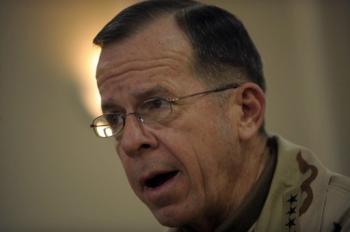Though he’s a warrior, not an economist, Adm. Michael Mullen, chairman of the Joint Chiefs, ranks the financial crisis as a higher priority and greater risk to security than the wars in Iraq and Afghanistan.
“The scope of it is, to me, mind-boggling,” said Mullen in an interview with Military Update Wednesday, just hours before President Barack Obama made his first visit to the Pentagon as commander in chief.
Mullen said it is a testament both to the nation’s strength and to the severity of the fiscal crisis that Congress last fall swiftly approved a relief fund of $700 billion to bail out banks and try to thaw frozen credit markets.
The amount nearly matched last year’s defense budget, Mullen noted, contrasting the speed of that action to the long, detailed process of setting military requirements, debating programs and passing a defense budget.
That’s “not even to speak of discussions, literally today, of a stimulus package that’s going to be another 800 or 900 billion (dollars). I think that’s going to affect all of us much more than personally,” Mullen said.
“I’ve been concerned and remain concerned about the impact of this on security,” he continued. “It’s a global crisis. And as that impacts security issues, or feeds greater instability, I think it will impact on our national security in ways that we quite haven’t figured out yet”
The financial crisis also underscores a need to tighten federal spending and, on military personnel accounts, that would include raising health care fees for working-age retirees, Mullen said. This surface warfare officer’s 40-year career has included command of three ships. He served as chief of naval operations before becoming the president’s top military advisor Oct. 1, 2007.
For an hour, Mullen discussed a wide range of topics including his top three priorities for military personnel. One is to ease the pace of wartime deployments so service members eventually spend twice as much time at home as they do deployed. The existing pace allows a grueling “one-to-one” ratio of “dwell time” at home to time away, usually in a war zone.
For Army and Marine ground forces, the ratio is less than one-to-one, Mullen said, which means these fighters, and peacekeepers, are spending more time in Iraq or Afghanistan than they do with families.
Marines are beginning to see some relief as its active force builds toward 202,000. “We’ve deployed the first new battalion,” Mullen said. “We’re going to deploy the second here shortly (and) the third in the spring or later on this year.”
His second priority for personnel, said Mullen, is to protect the “totality” of resources needed to attract and retain a robust volunteer force.
That means “it isn’t only about military pay,” he said, or quality health care, housing and barracks, base shopping, family support programs or hazard duty pay with in-theater tax relief. “It isn’t just benefits, and that’s the key. It’s all of those things, and there are more,” said Mullen. “So my second priority would be that we keep that together. …Too often as the budget crunch comes, those are the first things to go — and they can’t be.”
His third priority for personnel “is to make sure we get it right for our wounded, their families and the families of the fallen.”
“Those three would capture where I am with people,” Mullen said. “What those roll up to is a healthy, all-volunteer force, which we’ve got to have.”
However, Mullen added, the military “can’t just keep adding benefits.”
Higher fees should be set so they don’t “disadvantage somebody who really can’t afford this. Clearly one size doesn’t fit all,” Mullen said. But the financial crisis will lead to belt-tightening across all federal departments and defense will not and should not be spared, Mulllen said.
A recent Congressional Budget Office report included 115 options to make federal health care programs more efficient, including Medicare, Medicaid, Federal Employees Health Benefit Plan for civilian employees and the military’s TRICARE health system.
Would Mullen endorse higher military health care fees?
“I’ve done enough work on the working-age (retirees) to know we have to do that,” he said. “I would really have to look at the other categories to say, ‘Yeah, this is a part of it.’ But at a high level all of us — those of us who serve, who govern, who legislate — everybody has to figure out a way to contain costs of our people.”
By Tom Philpott
Military Update
Source: HeraldNet
